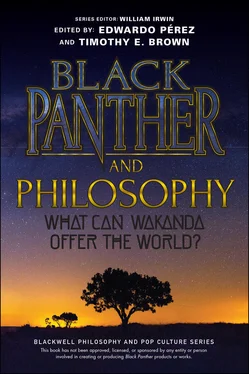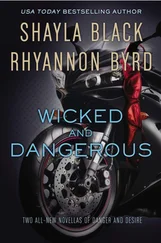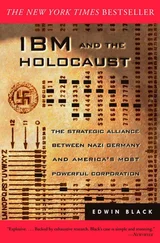Black Panther and Philosophy
Здесь есть возможность читать онлайн «Black Panther and Philosophy» — ознакомительный отрывок электронной книги совершенно бесплатно, а после прочтения отрывка купить полную версию. В некоторых случаях можно слушать аудио, скачать через торрент в формате fb2 и присутствует краткое содержание. Жанр: unrecognised, на английском языке. Описание произведения, (предисловие) а так же отзывы посетителей доступны на портале библиотеки ЛибКат.
- Название:Black Panther and Philosophy
- Автор:
- Жанр:
- Год:неизвестен
- ISBN:нет данных
- Рейтинг книги:4 / 5. Голосов: 1
-
Избранное:Добавить в избранное
- Отзывы:
-
Ваша оценка:
- 80
- 1
- 2
- 3
- 4
- 5
Black Panther and Philosophy: краткое содержание, описание и аннотация
Предлагаем к чтению аннотацию, описание, краткое содержание или предисловие (зависит от того, что написал сам автор книги «Black Panther and Philosophy»). Если вы не нашли необходимую информацию о книге — напишите в комментариях, мы постараемся отыскать её.
Black Panther and Philosophy: What Can Wakanda Offer The World
Black Panther
Black Panther and Philosophy
Black Panther and Philosophy — читать онлайн ознакомительный отрывок
Ниже представлен текст книги, разбитый по страницам. Система сохранения места последней прочитанной страницы, позволяет с удобством читать онлайн бесплатно книгу «Black Panther and Philosophy», без необходимости каждый раз заново искать на чём Вы остановились. Поставьте закладку, и сможете в любой момент перейти на страницу, на которой закончили чтение.
Интервал:
Закладка:
And ended with the following words:
[…] Sooner or later, we must learn to judge each other on our own merits. Sooner or later, if man is ever to be worthy of his destiny, we must fill our hearts with tolerance. For then, and only then, will we be truly worthy of the concept that man was created in the image of God – a God who calls us ALL – His children. 3
It’s a powerful column, one that not only resonates with the issues of today’s world, but that also reflects the message of Ryan Coogler’s 2018 film: that we are all “one single tribe.”
Of course, to be fair, Black Panther isn’t a perfect hero and Wakanda isn’t a perfect nation. T’Challa recognizes this in the film and so do the contributors of this volume, who analyze the character of Black Panther and the nation of Wakanda (seen in the film and comics) with a critical, philosophical eye, tackling issues of racism, colonialism, slavery, sexuality, feminism, politics, morality, spirituality, Afrofuturism, technology, and the wonders of vibranium with a mixture of insight and humor that not only reflects the nature of this philosophical series, but that also honors the tradition Stan (and Jack) started all those years ago.
Yibambe!
Ed and Tim
Notes
1 1.Joshua Ostroff, “Marvel comics icon Stan Lee talks superhero diversity and creating Black Panther,” Huffington Post, September 1, 2016, at https://www.huffingtonpost.ca/2016/09/01/stan-lee-marvel-superhero-diversity_n_11198460.html.
2 2.Stan Lee on Instagram: “Stan’s Soapbox, 1968,” at https://www.instagram.com/p/CBBlrsOp3Ox/?hl=en-gb.
3 3.Lee.
1 Challenge Day Tradition and Revolution in Wakanda
Armond Boudreaux
At its heart, Wakanda has a paradoxical nature: in its integration of technology into daily life, the reclusive nation is more like the industrialized countries of the Western world than its continental neighbors, but in its political structure, it has more in common with the ancient African past. Wakanda uses highly advanced science to improve the lives of its people, and yet it is ruled by kings who are selected through inheritance and ritual combat. In other words, it is a nation of contradictions, ruled by a complex synthesis of reason and tradition.
Moreover, Wakanda controls the Vibranium Mound, which is perhaps the most important resource on earth, a resource that has defined Wakandan society for millennia. Situated inside a mountain, the Vibranium Mound is what remains of a meteor that fell to Earth in the deep past. Though small amounts of vibranium have left Wakanda over the years (showing up in Captain America’s shield, US Agent’s shield, and in Ulysses Klaue’s sonic cannon, for example), the unearthly metal remains the property of Wakanda – and therefore the responsibility of its king.
The paradoxes at the heart of Wakandan society as well as its highly desirable resources mean that it is often the subject of attacks, invasions by outsiders, and attempted political revolutions. Many people have challenged its ancient traditions and political order, claiming to offer a better use of its resources or a more just society than the culture that has evolved organically over the course of millennia (as if it isn’t absolutely crazy to try to take over the Black Panther’s home turf!).
It seems as if every supervillain and misguided revolutionary thinks that he or she knows better than T’Challa how to run Wakanda. We see this, for example, when Eric Killmonger and Baron Macabre try to stage a coup in Jungle Action #17, when Achebe takes over Wakanda early in Christopher Priest’s run on the Black Panther book, when a radical group called The People tries to overthrow T’Challa’s rule in Ta Nehisi Coates’s run, and most recently in the Black Panther movie when Killmonger briefly takes over Wakanda in the name of combatting racism and injustice. Though each of these attempts at revolution is fueled by different motivations and values, each proves to be fruitless and costly – both to the revolutionaries and to the people they think they’re saving.
It might be tempting to say that Wakanda just hasn’t seen the “right” kind of revolution yet. Maybe all these revolutions fail because the revolutionaries are corrupt. Maybe their motives are not pure enough. Or maybe their plans simply haven’t been “smart” enough yet. Maybe what Wakanda needs is more moral and more intelligent revolutionaries. It might also be tempting to say that the Wakandan monarchy is simply strong enough to withstand revolutions, that might can overcome right. But there’s more at work in the preservation of Wakanda’s social order than the incompetence and corruption of the revolutionaries or the strength of Wakanda’s rulers in maintaining the status quo.
In fact, the repeated failed attempts at coup and revolution in Wakanda show two important things about political and social change. First, they show that pure reason divorced from tradition and custom cannot provide the social cohesion that is necessary for nations to exist. Second, they show that revolutions often destroy the thing that they seek to preserve – even (and perhaps especially) when they succeed in reinventing societies to fit the ideology of revolutionaries. Nations have to be able to reform and to respond to changing circumstances, but as the British statesman Edmund Burke (1729–1797) argued in a very different time and place than present-day Wakanda, true revolution poisons society rather than saves it.
“Don’t Scare Me Like That, Colonizer!”
At first it might seem a bit dubious to think that Edmund Burke can have anything to say about Wakandan politics. After all, Burke was a member of the British Parliament at a time when European nations had colonized much of Africa. And perhaps more than anything, Wakanda was created as a way of mythologizing what Africa might have been like if colonialism hadn’t happened. But Burke was a much more complicated man than our modern understanding of colonialism would lead us to believe. In fact, Burke spent a great deal of his career criticizing British colonial practices in India and America. Moreover, his ideas about politics and revolutions can easily lend themselves to a critical view of colonialism as a project, and no doubt T’Challa would find Burke to be a potent and persuasive ally in resisting attempted revolutions in Wakanda.
Like the people of Wakanda, Burke lived in a world of contradictions and tension between diverse people. Born in Dublin to a Catholic mother and Protestant father, Burke learned from an early age that an immensely complex system of conventions, arrangements, agreements, customs, and compromises makes it possible for different kinds of people to live together in a harmonious social order. For him, it was a miracle that the British nation had found a way for its diverse people to coexist in a stable and free society.
During his time in Parliament, Burke devoted himself to reforming the country that he loved. Throughout his career, he helped to reform criminal and financial law, opposed laws restricting religious dissenters, supported William Wilberforce’s efforts to end slavery, and worked to improve other aspects of the British government.
But today Burke is probably best known for his opposition to the French Revolution – a position that surprised a lot of people. Most of Burke’s contemporaries had expected the staunch Whig reformer to support the French in their efforts to liberalize their nation. Why wouldn’t Burke welcome what many considered to be a great reform of an antiquated and unjust system in France? His position made some of his contemporaries disparage him as a man who just wanted to preserve the past for its own sake (apparently, being a tireless reformer is a thankless job!).
Читать дальшеИнтервал:
Закладка:
Похожие книги на «Black Panther and Philosophy»
Представляем Вашему вниманию похожие книги на «Black Panther and Philosophy» списком для выбора. Мы отобрали схожую по названию и смыслу литературу в надежде предоставить читателям больше вариантов отыскать новые, интересные, ещё непрочитанные произведения.
Обсуждение, отзывы о книге «Black Panther and Philosophy» и просто собственные мнения читателей. Оставьте ваши комментарии, напишите, что Вы думаете о произведении, его смысле или главных героях. Укажите что конкретно понравилось, а что нет, и почему Вы так считаете.












